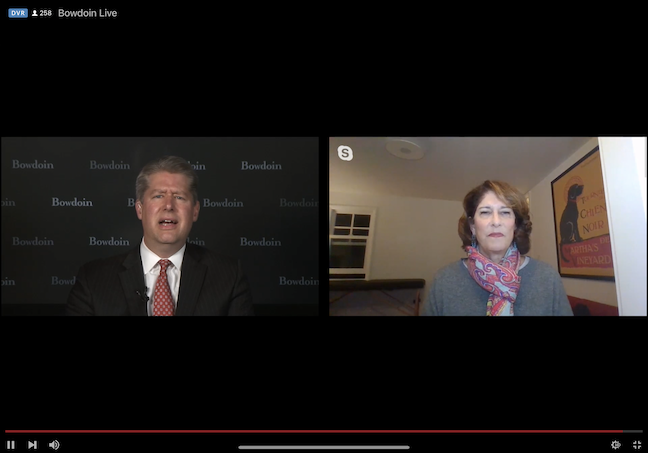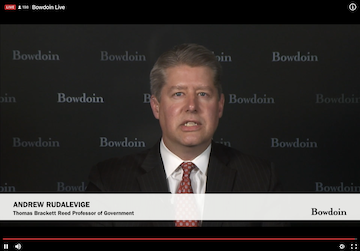Virtual Santagata Lecture opens debate on 2020 election
September 25, 2020
 Mackey O'Keefe
Mackey O'KeefeOn Monday night, in the first Santagata Lecture ever to be held virtually, Thomas Bracket Reed Professor of Government Andrew Rudalevige moderated a political debate between political journalists Jonah Goldberg and Mara Liasson.
Goldberg is a conservative columnist and a former editor of “National Review,” a right-leaning magazine. Liasson is an award-winning national political correspondent for NPR and a contributor to Fox News. Both journalists were invited to participate in the discussion by the College in an effort to foster debate about both the election and civic engagement.
The discussion, while centered on the 2020 presidential election, also included commentary on the state of President Trump’s base and the Republican Party, voter demographics in both 2016 and 2020, recent events and the implications of political media in the United States today.
Goldberg pushed back at the tendency to refer to this year’s election as “upcoming,” arguing that this year’s election is already well underway. For example, early voters are filling out and sending their mail-in ballots and will continue to do so every day until November 3.
Liasson reminded the audience that the timeline for this election extends past November 3 as well, given the quantity of mail-in votes that may be counted after that date.
“We might not have an answer to who won the election on election night,” she said.
Reflecting on the conversation, Rudalevige referred to the juxtaposition the nation is seeing as “stability despite momentous change.” A lot of that “momentous change” can be attributed to recent events, the most relevant in this debate being the passing of Supreme Court Justice Ruth Bader Ginsburg last week.
“I did know on Friday night as soon as I heard about it that it would change a little bit of the conversation,” Rudalevige said in a Zoom interview with the Orient. “This year has had so many things that have just come out of the blue that we wanted to be nimble about reacting to events.”
While the impact of Ginsburg’s death on the election remains to be seen, Liasson said she believes Ginsburg’s death offers Trump a “chance to change the subject,” but she also saw potential mobilization for Democrats.
“[Her death] is going to be an energizing force for Democrats,” Liasson said.
Goldberg, however, noted the strength of Trump’s connection with his base.
“He’s got this irreducible base that will support him no matter what,” said Goldberg.
In terms of the likelihood of a Trump victory, Goldberg explained that he doesn’t think he could win the popular vote, but, like in 2016, there is always the possibility of an Electoral College victory.
“Everything will get uglier after the election,” Goldberg said of this possibility.
“If [Trump] is reelected, he will have convinced the country that the pandemic is in the rear-view mirror…that Joe Biden is weak and a trojan horse for the Democratic Party,” Liasson explained.
 Mackey O'Keefe
Mackey O'KeefeToward the end of the event, the two offered insight into their experiences with media coverage of the election and the events surrounding it. While neither said they alter the content of what they say depending on the news outlet they are writing for, they both acknowledged that self-censorship has become normalized throughout the industry.
“The media is as polarized as any other part of American society,” Liasson said.
“This is hardly meant to be the last word on anything,” Rudalevige said. “It’s a first word, kind of a prompt to remind students, if nothing else, of the important issues that are at stake in this year or any election year, and to make you hungry for more civic engagement. To be a part of this discussion and this debate moving forward…To make you realize that there are big stakes for your participation.”
Comments
Before submitting a comment, please review our comment policy. Some key points from the policy:
- No hate speech, profanity, disrespectful or threatening comments.
- No personal attacks on reporters.
- Comments must be under 200 words.
- You are strongly encouraged to use a real name or identifier ("Class of '92").
- Any comments made with an email address that does not belong to you will get removed.

“‘If [Trump] is reelected, he will have convinced the country that the pandemic is in the rear-view mirror…,’ Liasson explained.”
Not really. If Trump is reelected it is extremely unlikely that he will have convinced the country about anything. It will almost certainly be a result of blatant dishonesty, rampant voter suppression, and the conservative bias of the electoral college.